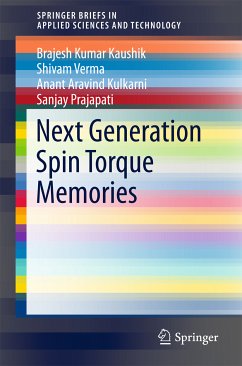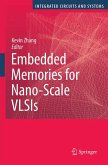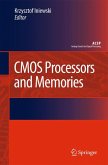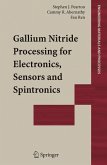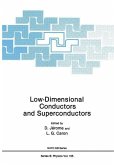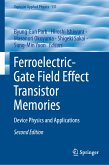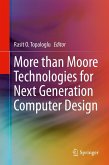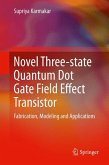Next Generation Spin Torque Memories (eBook, PDF)


Alle Infos zum eBook verschenken

Next Generation Spin Torque Memories (eBook, PDF)
- Format: PDF
- Merkliste
- Auf die Merkliste
- Bewerten Bewerten
- Teilen
- Produkt teilen
- Produkterinnerung
- Produkterinnerung

Hier können Sie sich einloggen

Bitte loggen Sie sich zunächst in Ihr Kundenkonto ein oder registrieren Sie sich bei bücher.de, um das eBook-Abo tolino select nutzen zu können.
This book offers detailed insights into spin transfer torque (STT) based devices, circuits and memories. Starting with the basic concepts and device physics, it then addresses advanced STT applications and discusses the outlook for this cutting-edge technology. It also describes the architectures, performance parameters, fabrication, and the prospects of STT based devices. Further, moving from the device to the system perspective it presents a non-volatile computing architecture composed of STT based magneto-resistive and all-spin logic devices and demonstrates that efficient STT based…mehr
- Geräte: PC
- ohne Kopierschutz
- eBook Hilfe
- Größe: 3.1MB
![Embedded Memories for Nano-Scale VLSIs (eBook, PDF) Embedded Memories for Nano-Scale VLSIs (eBook, PDF)]() Embedded Memories for Nano-Scale VLSIs (eBook, PDF)113,95 €
Embedded Memories for Nano-Scale VLSIs (eBook, PDF)113,95 €![CMOS Processors and Memories (eBook, PDF) CMOS Processors and Memories (eBook, PDF)]() CMOS Processors and Memories (eBook, PDF)113,95 €
CMOS Processors and Memories (eBook, PDF)113,95 €![Gallium Nitride Processing for Electronics, Sensors and Spintronics (eBook, PDF) Gallium Nitride Processing for Electronics, Sensors and Spintronics (eBook, PDF)]() Stephen J. PeartonGallium Nitride Processing for Electronics, Sensors and Spintronics (eBook, PDF)113,95 €
Stephen J. PeartonGallium Nitride Processing for Electronics, Sensors and Spintronics (eBook, PDF)113,95 €![Low-Dimensional Conductors and Superconductors (eBook, PDF) Low-Dimensional Conductors and Superconductors (eBook, PDF)]() Low-Dimensional Conductors and Superconductors (eBook, PDF)40,95 €
Low-Dimensional Conductors and Superconductors (eBook, PDF)40,95 €![Ferroelectric-Gate Field Effect Transistor Memories (eBook, PDF) Ferroelectric-Gate Field Effect Transistor Memories (eBook, PDF)]() Ferroelectric-Gate Field Effect Transistor Memories (eBook, PDF)113,95 €
Ferroelectric-Gate Field Effect Transistor Memories (eBook, PDF)113,95 €![More than Moore Technologies for Next Generation Computer Design (eBook, PDF) More than Moore Technologies for Next Generation Computer Design (eBook, PDF)]() More than Moore Technologies for Next Generation Computer Design (eBook, PDF)73,95 €
More than Moore Technologies for Next Generation Computer Design (eBook, PDF)73,95 €![Novel Three-state Quantum Dot Gate Field Effect Transistor (eBook, PDF) Novel Three-state Quantum Dot Gate Field Effect Transistor (eBook, PDF)]() Supriya KarmakarNovel Three-state Quantum Dot Gate Field Effect Transistor (eBook, PDF)73,95 €
Supriya KarmakarNovel Three-state Quantum Dot Gate Field Effect Transistor (eBook, PDF)73,95 €-
-
-
Dieser Download kann aus rechtlichen Gründen nur mit Rechnungsadresse in A, B, BG, CY, CZ, D, DK, EW, E, FIN, F, GR, HR, H, IRL, I, LT, L, LR, M, NL, PL, P, R, S, SLO, SK ausgeliefert werden.
- Produktdetails
- Verlag: Springer Nature Singapore
- Seitenzahl: 92
- Erscheinungstermin: 7. April 2017
- Englisch
- ISBN-13: 9789811027208
- Artikelnr.: 53034077
- Verlag: Springer Nature Singapore
- Seitenzahl: 92
- Erscheinungstermin: 7. April 2017
- Englisch
- ISBN-13: 9789811027208
- Artikelnr.: 53034077
- Herstellerkennzeichnung Die Herstellerinformationen sind derzeit nicht verfügbar.
He holds the position of Editor and Editor-in-Chief of various journals in the field of VLSI and Microelectronics. Dr. Kaushik is Editor-in-Chief of International Journal of VLSI Design and Communication System (VLSICS), AIRCC Publishing Corporation. He also holds the position of Editor of Microelectronics Journal (MEJ), Elsevier Inc.; Journal of Engineering, Design and Technology (JEDT), Emerald Group Publishing Limited; and Journal of Electrical and Electronics Engineering Research (JEEER), Academic Journals. He has received many awards and recognitions from International Biographical Center (IBC), Cambridge etc. His name has been listed in Marquis Who's Who in Science and Engineering® and Marquis Who's Who in the World®. His research interests are in the areas of High Speed Interconnects, Low power VLSI Design, Carbon Nanotube based Designs, Organic Electronics; FinFET Device Circuit Co-Design, Electronic Design Automation (EDA), Spintronics based devices and circuits.
ShivamVerma received the B.E. Degree in Electronics and Communication Engineering from Shri Vaishnav Institute of Technology and Science, Indore, India, and the M.Tech. Degree in Microelectronics from Indian Institute of Technology Varanasi, India, in 2010 and 2012, respectively. He is currently pursuing Ph.D. from Indian Institute of Technology Roorkee, India. He has published many papers in IEEE journals. His current research interests include spin transfer torque-based devices and all spin logic.
Kulkarni Anant Aravind received the B.E. Degree in Electronics Engineering from Shri Guru Gobind Singhji College of Engineering and Technology, Nanded, Maharashtra, India, in 2002, M.Tech. Degree in Electrical Engineering from Uttar Pradesh Technical University (presently Dr. A.P.J. Abdul Kalam Technical University), Lucknow, Uttar Pradesh, India in 2009, and M.Tech. Degree in Microelectronics and VLSI Design from Technocrat Institute of Technology, Bhopal, Madhya Pradesh, India in 2013. He is presently pursuing Ph.D. from Indian Institute of Technology Roorkee, India. He worked at Multitech Microsystems (Calibration Unit), Aurangabad as a trainee engineer from August, 2002 to June, 2003. He joined Department of Electronics and Communication Engineering, Marathwada Institute of Technology, Bulandshahr, India as lecturer from July, 2003 to January, 2007. He joined Electronics and Communication Engineering Department, Meerut Institute of Engineering and Technology, Meerut, India as lecturer in February, 2007 and served there till January, 2008. He joined Electrical, Electronics, and Power Engineering Department, College of Engineering, Ambajogai, Maharashtra, India, and worked as senior lecturer from February, 2007 to May, 2009 and where since June 2009, he has been working as Assistant Professor. His current research interests include Spintronics based devices, and circuits.
Sanjay Prajapati received the B.E. Degree in Electronics and Communication Engineering from Government Engineering College (GEC), Modasa, Gujarat, India in 1996 and M.Tech Degree in VLSI Design from Nirma University, Ahmedabad, Gujarat, India in 2010. He is pursuing Ph.D from the Indian Institute of Technology, Roorkee, India,since July, 2015. He served as a lecturer in the Department of Electronics and Communication Engineering, Government Polytechnic, Surat, Gujarat, India, from October, 1998 to October, 2004. He became an Assistant Professor at Vishwakarma Government Engineering College, Ahmedabad, Gujarat, India in October, 2004 and later promoted as an Associate Professor in September, 2012 at Government Engineering College, Dahod, affiliated to Gujarat Technological University, Ahmedabad, Gujarat, India. He has attended several workshops, seminars and faculty development programs of national level. He has more than seventeen years of research and academic experience. His current research interest includes Spintronic device modeling and logic design.
